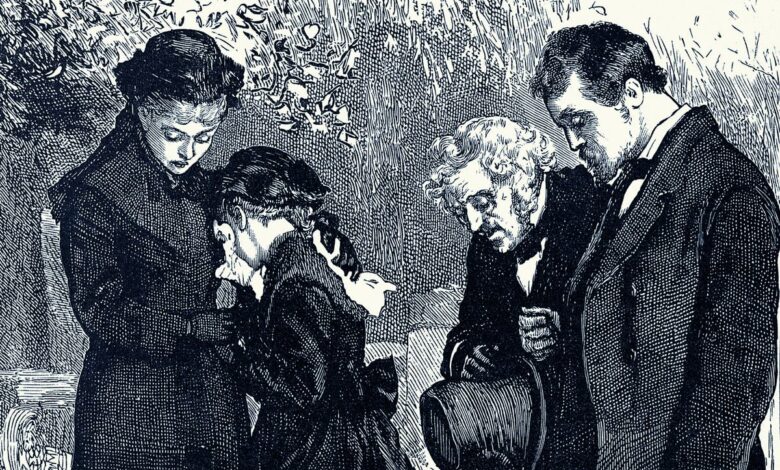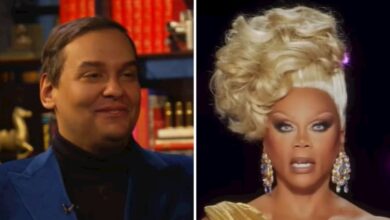Scared to talk about death? Blame the Victorians

There is a chapter in Cariad Lloyd’s new book You Are Not Alone that considers the concept of a digital archive of memories left behind after a person’s death. It prompted me to call my dead friend’s voicemail in the hope I could hear their voice again. While I have photographs of us together, video footage on a dusty CD of us drunk and giddy at Sydney Harbor, it was the seemingly mundane and impersonal message on their mobile phone I craved. But when I called, the line was dead.
“That’s happened to a lot of my guests,” Lloyd tells me, of the stars who’ve joined her on her multi-award winning Griefcast podcast. “Phone companies sell dead people’s numbers and people don’t realise. [So they] call the number and some random person picks up. We mistakenly think these messages are still out there in the ether.”
Like many of us, Lloyd – a comedian, actor and writer – is grieving. Her father died when she was 15 years old of secondary pancreatic cancer. “It was sad, but my story isn’t tragic, it’s depressingly everyday,” she writes in her book. Eighteen years later, she created Griefcast as a space to discuss death – guests have included Romesh Ranganathan, Jon Ronson, Sara Pascoe and Jayde Adams. Now, she’s written You Are Not Alone as a result of “all the conversations and information I gathered trying to find my way through my own grief.”
To describe it as essential reading doesn’t go far enough for such an important subject. Despite this, I’ll admit to a certain degree of trepidation upon turning the cover, something Lloyd understands. “No one wants to pick it up,” she says. “Like, ‘Who died? And they wrote a book about it? Why?’ Your heart sinks: ‘I’m going to have to read the sad book’.”
Mercifully, the book takes a humorous and accessible approach to a subject she calls “both universal and unique”. In addition to the lessons learnt by Lloyd and vignettes about her own experiences of grief, perhaps its most important function is skewering so many of the entrenched ideas around death that still hold enormous sway today. Take, for example, the “five stages” model of grief: denial, anger, bargaining, depression and acceptance. Or, as Lloyd calls it, “the worst boyband ever made”. Made famous by Elisabeth Kübler-Ross in her 1969 book On Death and Dying, the theory was actually created for people who were dying of a terminal illness, not those who were left behind. Yet it became a touchstone that people like to return to again and again. For Lloyd, this is a problem – it envisages “an end point that encourages us (and those around us) to see our continued grief as a failure”.
Lloyd’s initial belief in the model led her to believe that she was “doing grief wrong”. She says: “I never liked [it], but it wasn’t until I was doing Griefcast that I decided to do some research and actually read the book. And it’s a great book for 1969! But it made me sad that so many grieving people were relying on it and using it. We wouldn’t take any women’s rights advice, mental health advice or medical advice from 1969 – the world has moved on so much. But with grief, because we don’t talk about it, it’s frozen in that period. It’s like, ‘this is really bad for you; out-of-date food; do not eat this’. But, slowly, more people are aware that it’s not that helpful.”
It’s the Victorians we can blame for many of our archaic attitudes to death and dying. So much of our grief vocabulary comes from the nineteenth century, laments Lloyd: having a finite time to mourn; wearing black; being polite and respectful. “Let us free ourselves from the stigma of behaving ‘inappropriately’,” she declares. Is such a prospect possible for us buttoned-up Brits? Lloyd believes so.
“I think we have to constantly question everything, especially [when it comes to] grief, because we haven’t questioned it for so long,” she says. “Why we need to wear black, why we might feel we can’t go to the pub and laugh really loudly… what is it that’s making us feel that way? Wearing black… well, you might feel sombre, but if you need to laugh with your friends, go and laugh with your friends! If you want to not cry at the funeral because actually that day you feel OK, don’t cry at the funeral. Whenever you say [a] sentence beginning ‘I should be doing this’, that’s exactly when we need to question it.”
Lloyd’s emotional literacy around death hasn’t just been developed by self-reflection, or her podcast, but also her conversations with death industry professionals such as palliative care nurses and death doulas. Essentially, she’s just talked a whole lot about it. It’s an ambition she feels we can all aspire to. “Grief is not a mental health problem, but it definitely comes under the ‘talking about emotions’ umbrella,” she says. “Generally speaking, we’re not good with uncomfortable emotions.”
What we really need is practice, she thinks. “When grief does arise in your life – and everyone knows someone who has lost someone – don’t change the subject when it’s [talked about],” she advises. “Sit with that discomfort. I interviewed Rob Delaney a while ago and we were talking about his amazing book about the loss of his son, Henry, and what happens when you talk about loss to someone who’s uncomfortable. What you’re really asking for is about four seconds. Four seconds of ‘don’t change the subject, look me in the eye, and accept that what has happened to me is awful’.”
It’s OK to find death hard to talk about, she says. Feeling frightened or nervous is perfectly natural. What matters is that you try. “Fear and social awkwardness drive us to seek to contain grief, tidy it up, run away [from it] – as if tears were petrol and we’re all holding matches,” she writes in You Are Not Alone. “We need to get better at being uncomfortable, at not knowing what to say and admitting that we’re scared.”
And it’s also OK to get it wrong, she insists. “Don’t worry. There’ll be another time! You can even say to that person, ‘I’m really sorry – last time you brought this up, I had a real panic and didn’t know what to say. But I’m here’. I’ve had that with friends who’ve experienced grief that isn’t in my wheelhouse, especially with child loss. I’ve had to really learn to fight my own fears and my own panic and realise it’s not about me, it’s about them. It’s hard. You’re trained from a very young age not to do that. [But] you can be kind to yourself if you’re getting it wrong. It’s unnatural to get it right.”
As well as pages of “grief resources”, the back of You Are Not Alone also includes a list of what Lloyd calls “funeral chat icebreakers”: questions designed to start conversations about a person’s wishes after they die. These can include whether a person wishes to be buried or cremated, what kind of music they might want, whether they want flowers, or whether anyone is not invited. If reading this strikes you as morbid, blame those pesky Victorians again.
“Funerals are such a good way to gently start a conversation about death,” says Lloyd. “People don’t seem to mind talking about what music they want at their funeral as much, because it’s a bit ‘party-planning’, isn’t it?” she laughs. She acknowledges that this can be hard if someone doesn’t want to have this conversation, however. “The urge to run away from death is pretty universal,” she writes. “It’s not as simple as rudeness or cruelty; it’s self-protection.”
But grief – and death – is coming for us all. Whether we repress this fact or not, removing the stigma from conversations about dying can only be a good thing.
Cariad Lloyd’s ‘You Are Not Alone’
‘You Are Not Alone’ is published by Bloomsbury Tonic and is available to buy now
Cariad Lloyd: ‘We need to get better at being uncomfortable’





